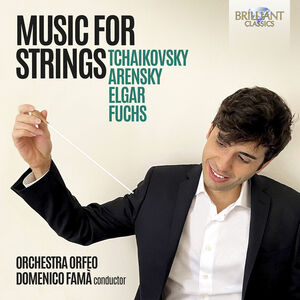Show results for
Deals
- Blu-ray Outlet
- New Release 4K
- New Release Blu-ray
- New Release DVD
- New Release Gifts
- New Release Music
- New Release Vinyl
- Top Seller 4K
- Top Seller Blu ray
- Top Seller DVD
- Top Seller Vinyl
- top sellers all movies
- top sellers all music
- Top Selling Gifts
- TV Outlet
- Top Seller Music
- DVD Outlet
- In Stock Outlet
- Music Outlet

Music for Strings
- Format: CD
- Release Date: 23/09/2022

Music for Strings
- Artist: Orchestra Orfeo
- Label: Brilliant Classics
- Genre: Classical
- UPC: 5028421966090
Product Notes
The golden age of string orchestra repertoire must certainly be the period spanning the final decades of the 19th century to the early 20th century. The density of sound, great dynamic range, long phrases and virtuosity that are uniquely possible with this combination of instruments saw it become a particularly cherished ensemble for many of the greatest composers of the day. Tchaikovsky's Andante Cantabile is the composer's own transcription of the second movement from his famous String Quartet No.1, prepared for a private concert in Paris (February 1888) with cellist Anatoly Brandukov and the Edouard Colonne Orchestra conducted by the composer. Russian composer and pianist Anton Arensky (1861-1906), who was strongly influenced by Tchaikovsky's style, is particularly known for his Variations Op.35a on a theme by Tchaikovsky. Again, this is an own-arrangement of the second movement of Arensky's String Quartet No.2 in A minor. Written in 1894 on the occasion of Tchaikovsky's death, the work takes as it's theme Tchaikovsky's song 'Legend', adding seven variations and a coda. Elgar's Elegy for Strings was written in 1909 after the funeral of Robert Hadden - one of the members of the Worshipful Company of Musicians in London - at the suggestion of Elgar's publisher Alfred Littleton and intended as a commemorative piece for future ceremonies. It was first performed in St Paul's Cathedral in 1914, where it is still heard for commemorative celebrations today. It's popularity is justified by the poignant beauty of every single musical phrase. Most famous for his series of serenades for string orchestra, Robert Fuchs (1847-1927) is considered a worthy heir to the Viennese romantic musical tradition.


